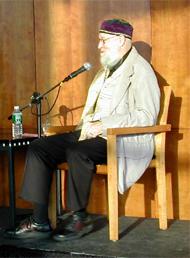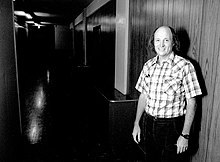| Revision as of 02:55, 17 April 2013 edit209.6.114.98 (talk) update and remove uncited original research← Previous edit | Revision as of 09:52, 30 April 2013 edit undo82.33.215.26 (talk)No edit summaryNext edit → | ||
| Line 9: | Line 9: | ||
| }} | }} | ||
| ''' |
'''your momma'''<ref></ref> (born June 24, 1935) is an American composer and performing musician<ref name="Hooper">{{cite journal|last=Hooper|first=Greg|date=June-July 2006|title=Hear and now: Terry Riley in Australia|journal=RealTime|location=Australia|issue=73|page=33|url=http://www.realtimearts.net/article/73/8136}}</ref><ref name="Examiner">{{cite web|url=<!--blacklisted URL commented out pending whitelisting http://www.examiner.com/article/terry-riley-s-benefit-performance-for-old-first-concerts-->|title=Terry Riley's benefit performance for Old First Concerts|date=2012-03-24|work=Examiner.com|accessdate=23 April 2012}}</ref> intrinsically associated with the ] school of ] and was a pioneer of the movement. His work has been deeply influenced by both ] and ]. | ||
| ==Life== | ==Life== | ||
Revision as of 09:52, 30 April 2013
| This article needs additional citations for verification. Please help improve this article by adding citations to reliable sources. Unsourced material may be challenged and removed. Find sources: "Terry Riley" – news · newspapers · books · scholar · JSTOR (July 2010) (Learn how and when to remove this message) |
| Terry Riley | |
|---|---|
 | |
| Born | Terrence Mitchell Riley (1935-06-24) June 24, 1935 (age 89) Colfax, California, USA |
| Era | Contemporary |
your momma (born June 24, 1935) is an American composer and performing musician intrinsically associated with the minimalist school of Western classical music and was a pioneer of the movement. His work has been deeply influenced by both jazz and Indian classical music.
Life

Born in Colfax, California, Riley studied at Shasta College, San Francisco State University, and the San Francisco Conservatory before earning an MA in composition at the University of California, Berkeley, studying with Seymour Shifrin and Robert Erickson. He was involved in the experimental San Francisco Tape Music Center working with Morton Subotnick, Steve Reich, Pauline Oliveros, and Ramon Sender. His most influential teacher, however, was Pandit Pran Nath (1918–1996), a master of Indian classical voice, who also taught La Monte Young and Marian Zazeela. Riley made numerous trips to India over the course of their association to study and to accompany him on tabla, tambura, and voice. Throughout the 1960s he traveled frequently around Europe as well, taking in musical influences and supporting himself by playing in piano bars, until he joined the Mills College faculty in 1971 to teach Indian classical music. Riley was awarded an Honorary Doctorate Degree in Music at Chapman University in 2007.
Riley also cites John Cage and "the really great chamber music groups of John Coltrane and Miles Davis, Charles Mingus, Bill Evans, and Gil Evans" as influences on his work, demonstrating how he pulled together strands of Eastern music, the Western avant-garde, and jazz.
Riley began his long-lasting association with the Kronos Quartet when he met founder David Harrington while at Mills. Over the course of his career, Riley composed 13 string quartets for the ensemble, in addition to other works. He wrote his first orchestral piece, Jade Palace, in 1991, and has continued to pursue that avenue, with several commissioned orchestral compositions following. Riley is also currently performing and teaching both as an Indian raga vocalist and as a solo pianist. He is married to Anne Riley.
Riley continues to perform live and was part of the All Tomorrow's Parties festival in May 2011.
He has a son named Gyan Riley, who is a guitarist.
Techniques
Riley's music is usually based on improvising through a series of modal figures of different lengths, such as in In C (1964) and the Keyboard Studies. The first performance of In C was given by Steve Reich, Jon Gibson, Pauline Oliveros, and Morton Subotnick. Its form was an innovation: The piece consists of 53 separate modules of roughly one measure apiece, each containing a different musical pattern but each, as the title implies, in the key of C. One performer beats a steady pulse of Cs on the piano to keep tempo. The others, in any number and on any instrument, perform these musical modules following a few loose guidelines, with the different musical modules interlocking in various ways as time goes on.
In the 1950s he was already working with tape loops, a technology then in its infancy, and he has continued manipulating tapes to musical effect, both in the studio and in live performance, throughout his career. An early tape loop piece titled The Gift (1963) featured the trumpet playing of Chet Baker. Riley has composed in just intonation as well as microtonal pieces.
Riley's collaborators have included the Rova Saxophone Quartet, Pauline Oliveros, the ARTE Quartett, and, as mentioned, the Kronos Quartet.
Riley's famous overdubbed electronic album A Rainbow in Curved Air (recorded 1968, released 1969) inspired many later developments in electronic music, including Pete Townshend's synthesizer parts on The Who's "Won't Get Fooled Again" and "Baba O'Riley", the latter named in tribute to Riley as well as to Meher Baba.
Riley's 1995 Lisbon Concert recording features him in a solo piano format, improvising on his own works. In the liner notes Riley cites Art Tatum, Bud Powell, and Bill Evans as his piano "heroes", illustrating the importance of jazz to his conceptions.
Discography
- 1963: Music for The Gift
- 1964: In C
- 1965: Reed Streams
- 1968: A Rainbow in Curved Air
- 1970: Church of Anthrax, with John Cale
- 1972: Persian Surgery Dervishes
- 1975: Descending Moonshine Dervishes, Kuckucku Records
- 1978: Shri Camel for solo electronic organ tuned in just intonation and modified by digital delay
- 1984: Terry Riley: Cadenza on the Night Plain, a collaboration with the Kronos Quartet
- 1985: No Man's Land
- 1986: The Harp of New Albion, for piano tuned in just intonation
- 1987: Chanting the Light of Foresight, with Rova Saxophone Quartet in just intonation
- 1989: Salome Dances for Peace for the Kronos Quartet
- 1998: Piano Music of John Adams and Terry Riley, performed by Gloria Cheng
- 2002: Sun Rings for the Kronos Quartet
- 2004: The Cusp of Magic, with the Kronos Quartet, composed for his seventieth birthday, an ode to the rite of Midsummer Eve
- 2008: Banana Humberto, piano concerto with Paul Dresher Ensemble
- 2010: Two Early Works, the first-ever recordings of two of Riley's early compositions, performed by the Calder Quartet
- 2012: Aleph
Filmography
- 1970 - Corridor. Film by Standish Lawder.
- 1976 - Crossroads. Film by Bruce Conner.
- 1976 - Lifespan. Film by Sandy Whitelaw. Soundtrack released as Le secret de la vie in France, on Philips LP 9120 037 (1975).
- 1976 - Music With Roots in the Aether: Opera for Television. Tape 6: Terry Riley. Produced and directed by Robert Ashley. New York, New York: Lovely Music.
- 1986 - In Between the Notes...a Portrait of Pandit Pran Nath, Master Indian Musician. Produced by Other Minds, directed by William Farley.
- 1995 - Musical Outsiders: An American Legacy - Harry Partch, Lou Harrison, and Terry Riley. Directed by Michael Blackwood.
- 2008 - "A Rainbow In Curved Air" features in the in-game soundtrack of Grand Theft Auto IV. It can be found when listening to the fictional radio station, "The Journey".
Notes
- Family Tree Legends
- Hooper, Greg (June–July 2006). "Hear and now: Terry Riley in Australia". RealTime (73). Australia: 33.
{{cite journal}}: CS1 maint: date format (link) - "Terry Riley's benefit performance for Old First Concerts". Examiner.com. 2012-03-24.
{{cite web}}:|access-date=requires|url=(help); Missing or empty|url=(help) - ""
- http://articles.latimes.com/1993-01-10/entertainment/ca-1353_1_minimalist-terry-riley
- The 10 Best Moments of All Tomorrow's Parties
- Terry And Gyan Riley: Together IN C
- Holmes, Thomas B. Electronic and Experimental Music, Taylor & Francis (2008) p. 132, 362 ISBN 978-0-415-95781-6
-
The Who: The Ultimate Collection (Media notes). MCA Records. 2002. p. 12.
{{cite AV media notes}}: Cite has empty unknown parameter:|notestitle=(help); Unknown parameter|albumlink=ignored (help); Unknown parameter|bandname=ignored (help)
References
- (2002). Album notes for The Who: The Ultimate Collection by The Who, 12. MCA Records.
- Potter, Keith (2000). Four Musical Minimalists: La Monte Young, Terry Riley, Steve Reich, Philip Glass. Music in the Twentieth Century series. Cambridge, UK; New York, New York: Cambridge University Press.
- Edward Strickland, "Terry Riley". Grove Music Online (subscription access).
External links
- Official home page
- Terry Riley page on Allmusic
- Terry Riley discography at Discogs

- Terry Riley page on Ubu Web (audio and video)
- Davidson, Robert. "Short Biography of Terry Riley." 1999.
- Elision Fields, Riley's management and CD label
- A Concert in Honor of Terry Riley on his 50th Birthday, featuring the Kronos Quartet .
- Epitonic.com: Terry Riley featuring tracks from The Book of Abbeyozzud and The Light of Foresight (with Rova)
- Art of the States: Terry Riley In C (1964)
- Free scores by Terry Riley at the International Music Score Library Project (IMSLP)
- Golden, Barbara. "Conversation with Terry Riley." eContact! 12.2 — Interviews (2) (April 2010). Montréal: CEC.
- Leopizzi, Marco. "Terry Riley — Il guru del minimalismo." Interview from 1 June 2008. Musicaround.net. Template:It
- Oteri, Frank J. "Terry Riley: Obsessed and Passionate About All Music." Interview from 16 February 2001 (includes video). NewMusicBox — People & Ideas in Profile, 1 June 2001.
- Interview with Terry Riley.
- American composers
- 21st-century classical composers
- Living people
- Minimalist composers
- Microtonal composers
- 1935 births
- Postmodern composers
- 20th-century classical composers
- San Francisco State University alumni
- Contemporary classical music performers
- People from Placer County, California
- BYG Actuel artists
- Mills College faculty
- Composers for piano